Fishing new waters is often quite difficult. It could involve a new species, require different gear or just a new water type, whatever the case it can often be hard to fish successfully under new conditions.
Expedition 1: Lake Eildon
In November 2012 I was lucky enough to accompany Rhys and Jim Creed on a camping trip to Lake Eildon, a new water body which neither of us had ever fished before. The target of our trip was the trophy sized yellowbelly which can be found in the lake.
Arriving at the dam at lunch time on a Wednesday afternoon, brimming with excitement at getting the chance to fish this new waterway, the boat was quickly launched into the water and our lures tied on. Our lure and gear choice was one which sparked some debate. There were the numerous options to consider: what outfit to use, what lure style to use and what line rating as well. These were all important factors which would allow us to reach our goal of a trophy size Yella.
The choice of gear was to cast small lipless crankbaits and small Mudguts spinnerbaits using a spin outfit loaded with 6lb braid and a 10lb fluorocarbon leader. This option was not arrived at easily and it is important to take the time to consider what gear to use because this is what is going to catch you the fish. Our tactic was to use old editions of Freshwater Fishing Magazine to research the gear commonly used for yellowbelly in dams as well as asking some more in-the-know fisherman as to what they use. This small effort allowed us to get the appropriate gear which boosted our confidence in being able to catch fish in this new waterway.
With the gear all ready to go and the boat in the water, we were keen to wet a line as soon as possible. As we had never been to this lake before, let alone fished it, an idea as to where to go was needed. A map of the lake purchased at the tackle store allowed us to identify areas which we could launch the boat at and possible areas to target fish. Not only is this helpful for fishing but also for safety, not having a general idea of the lake could get you lost.
We were initially unsure as to what tactic to use; should we cast at standing timber? Or troll the timber and rock drop offs? Where would be the best spot to start? I decided it would be best to put some distance between us and the boat ramp first and find a nice bay in which to cast at some timber – something which Rhys and I are quite too familiar with. When in doubt do what you would normally do in your usual fishing spot, this will make you feel more comfortable to begin with and also improve your confidence.
Lady luck was on our side as this tactic worked almost instantly. Within a few hours of casting at timber we had tempted a strike, caught a 43cm Brown trout and had our first chance to strike gold.
We were casting in a small, secluded bay at some tall standing timber. I launched out a cast into the crystal clear water landing it right up against the timber. At the end of the wind, as the lure came into view we both saw a huge yellowbelly of about 60cm or greater following the small crank bait back to the boat. As the lure came closer the fish could no longer withstand its primal instinct and turned and ate the lure. Setting the hooks, the fish surged towards the bottom stripping line off the small Shimano reel effortlessly. With 6lb line there was little I could do to turn him as he powered downwards. Eventually his run came to an end as quickly as it had begun as he had wrapped my line amongst a jungle of timber eight metres below us. The fish was lost but it gave us the confidence we needed to continue fishing with the tactics we were using.
The second day saw us utilize the same tactics – cast at timber and rocky banks. In just two hours we had a small redfin and another breath taking experience. The boat was drifting along a steep sloping bank towards a tangled bunch of logs – a prime haunt for Murray Cod. Rhys lobbed a small Mudguts spinnerbait towards the log as the boat drifted by. The both of us watched as the lure slowly fluttered downwards toward the bottom, however it never made it because as it passed the log it was crunched by a solid cod of about 60cm. We had seen the beast launch itself out at the lure and grab it, but it didn’t like the spikey owner hook and just as quickly it had spat the lure out. Despite our rugged persistence over the next few days we could only get the fish to follow the lure once again, let alone to eat it – it had learned a valuable lesson.
We stuck with this tactic for the rest of the day managing to land two beastly carp and another few redfin, but none of those prized Goldens we were after. One and a half days in and we still hadn’t landed our target species – could it be time for a tactical change?
That night, by the campfire light, we harvested a wealth of knowledge about fishing Lake Eildon. We had brought with us a dozen or so old Freshwater Fishing Magazines which contained articles on fishing Lake Eildon. These proved to be invaluable in aiding our quest for gold. Each article was read carefully and important points were noted mentally between the two of us, ready to be put into use the following day.
The third day saw us rise at 5am for the third time in a row, but our hard work and dedication eventually payed off. We applied what we had learnt last night, deciding to test out the suggestions from the magazines. The weather was against us as battering winds and light drizzle tried to put a damper on our spirits, but our just deserts came that afternoon.
Rhys made a quick lure change as we pulled up into a familiar bay which blocked some of the fierce wind. Only a few casts in and he received a follow and a hit from a small golden. Just a couple casts later the fish was interested again and this time the hooks stuck. At 40cm it wasn’t quite the trophy fish we were after but it was success all the same, as we had finally managed to land a Lake Eildon Yellowbelly. That same day we managed another couple follows from larger goldens in the 50cm+ bracket range, of which weren’t too keen on eating our lures.
During our time on the lake it also paid to talk to other anglers. A quick chat to some other like-minded individuals can be very helpful in identifying what techniques are working, what is being caught and if they’re keen to divulge the information, where the fish are being caught at. All the people we spoke to were also finding the fishing tough as well, of all the groups we talked to only one had landed a small yellowbelly as well as a cracking 63cm Brown trout by-catch.
This trip had taught us a valuable lesson – that fishing new waters is a difficult task and that quite a bit of effort is required for success. Despite our lack of success at Eildon we were still ever keen to try out some more new water challenges and our opportunity came only a few weeks later in early December. Our next challenge was Blowering Dam.
Both Rhys and I had fished this dam before with our families during the day but hadn’t really done any ‘real’ fishing. In a last minute arrangement it was decided that we head up to the dam on a Monday night and do some night trolling. We had never employed this tactic before so it would be a whole new experience.
Ensuring you check off the following before your next new water adventure could be the difference between success and failure:
- Lure styles and types – A few different ones would be beneficial, don’t be afraid to experiment.
- Appropriate gear – threadline or baitcaster, what line poundage? Make sure you have the right gear for the type of fishing you are doing.
- A map of the area – not only for safety but will help in identifying places to launch a boat and fish as well.
- Check your equipment – if you require the use of tools you don’t usually use (such as the lights on the boat) before heading off check that they work.
- Tactics – if unsure of what tactics to use begin with what you are comfortable with, if this doesn’t work change tactics, this could be lure style, casting or trolling or just location.
- Research – read up on your chosen destination either on the internet or in fishing magazines.
- Ask! – One of the best places to go for information is the tackle shop. Staff are always keen to give you some of the good oil on what to use, safety tips and possible locations to try out.
- Other anglers – it can be beneficial and interesting to talk to some of the other people out on the water. Ask them if they are catching anything, what are they using, what’s been working for them?
- Regulations – be sure to check up on the rules and regulations for the area you are going to. If the destination is in another state remember to get the correct licence to fish in that state.
Expedition 2: Blowering Dam
This being a new experience for both of us we had to make sure we had the appropriate set up to be fishing in the dark. It was very important to ensure the boat navigation lights where working and that we had a few spare lights on board in case of any emergencies (initially the lights weren’t working due to corrosion of the cables to the battery). Getting lost out on the dam in the pitch black of night would be catastrophic. Setting the gear up in the boat can be vital in ensuring that the required tools can be found and also that certain expensive things are not broken (in the dark we managed to break a reel as well as a rod tip). Blowering is classified as an alpine dam (as are all waters within the Kosciusko National Park) meaning that it is compulsory to wear a life jacket at all times when out on the dam. I would recommend the inflatable type as they are much more comfortable and less obtrusive to fish in.
We arrived at Blowering Dam with an hour of light to spare and cast along the steep rocky banks until dark managing to catch a small redfin in the process. Once the sun had set it was time to begin trolling. The dam is popular for night trolling and this was evident from the other half dozen boats whose lights could be seen slowly patrolling the shorelines. Using the sounder we located a deeper stretch with a bit of timber to troll along. Our chosen lures were 90mm AC Invaders in the Forbes Special and Mr T colours (colours 73 and 74) – these lures have an extremely good action which big Murray Cod just can’t resist and come in a plethora of different colours to satisfy every fisherman’s needs.
The fishing was slow as we trolled through our first run before moving on to better waters. It wasn’t until three hours of solid trolling later that the fish started to show some interest in the artificial offerings which had been slowly rattling past their faces. We were on our fourth run along the long trolling stretch when my AC Invader was met solidly by a good fish. I struck hard to set the hooks but was disappointed when there was no weight felt on the end of the line. It really pays to upgrade the hook on yours lures, we retro-fit ours with Owner treble hooks. These hooks are razor sharp and will greatly improve your hook uprate, however they are not 100% guaranteed and the fish will still manage to avoid them in some situations (such as this instance).
With our first big fish action for the night we quickly turned the boat around to troll over the same spot to see if we could get her to hit again. Our lures were just bumping over the submerged bottom five metres below when Rhys’s lure was hit hard by a good fish.
His rod immediately loaded up with the weight of a very decent fish which was stubborn and just wouldn’t move itself from the bottom. It didn’t take long for the fish to realise it was hooked and soon made a run for it. The rod pulsed up and down with the head shakes of a large cod trying to rid itself of the unfamiliar thing it had just eaten. A few minutes and a couple of bursting runs later and Rhys had the fish five metres below the boat with the task of getting him to the surface.
The fish was determined to evade its capturers and began doing laps of the boat, eventually surfacing at the back of the boat where we could see it in all its glory.
It was a monster Murray Cod, bigger than anything we could have ever managed to dream of. After being in the spotlight for only a brief moment it was now keen to get back down to the depths. With very little effort the fish surged back to the bottom stripping the 30lb line off a locked drag with ease. It was back to square one.
The anticipation was high and the adrenaline had spiked after seeing such a brute of a cod and it was only a minute or two before we got a second look as the fish emerged beat on the surface beside the boat. This Murray Cod was enormous and in superb condition and with great care we lifted it into boat where, after a couple photo’s, it stretched the tape right out to 120cm and an estimated 80lb’s.
With our trophy stored on the SD card of the camera, the fish was carefully swam in the crystal clear water for a minute before it powered back off to the depths, causing the dam to rise another half a per cent. We both had to pinch ourselves to make sure that we weren’t dreaming as we would normally be doing at this time of night. This was definitely a fish of a lifetime and had been caught during our first night expedition to this new type of fishing.
These two trips to new waters contrast the difference in fortunes which is typical of any fishing trip, but it definitely highlights the success and adventure which can be had in venturing out into unknown territory. There can be a lot more preparation required initially but this is essential in ensuring that your next trip into new waters is both safe and successful. Are you already planning your next trip to new waters, I know I am!
Jack Zyhalak

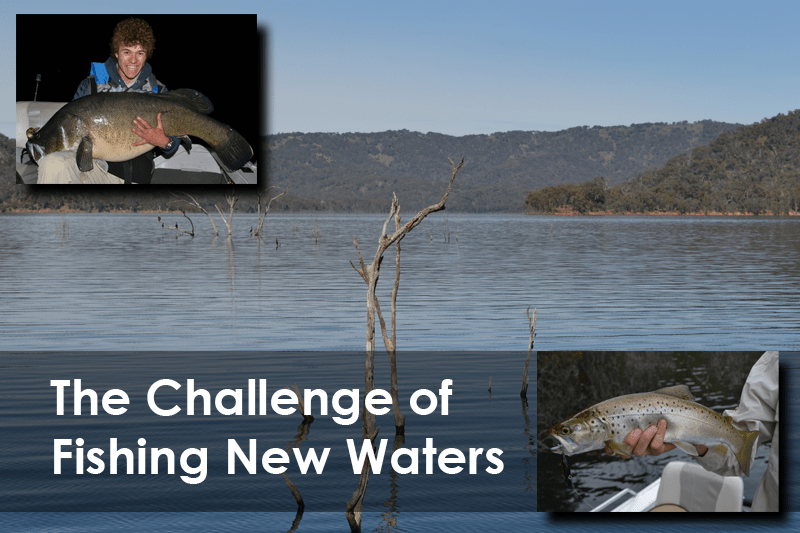
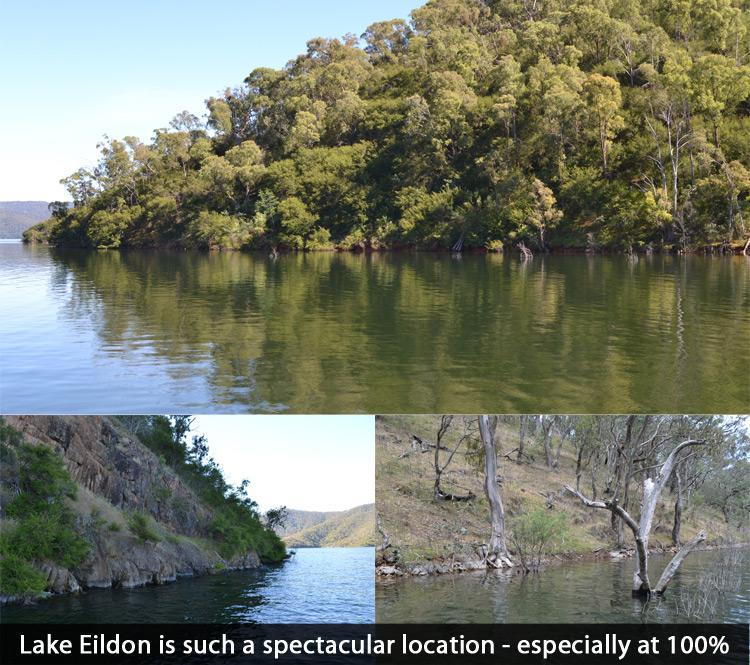
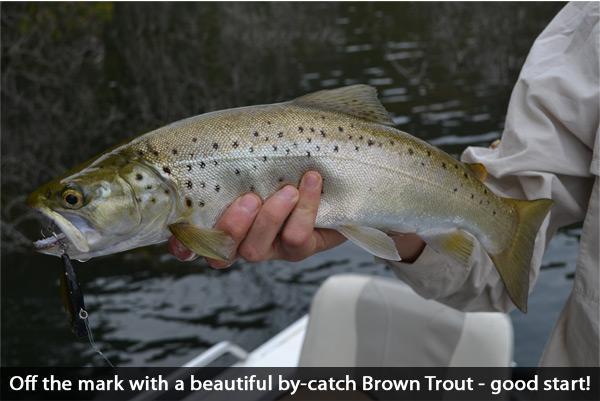
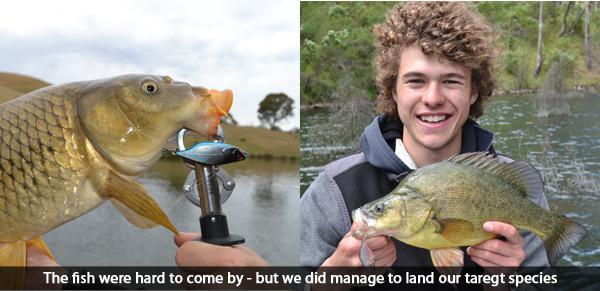
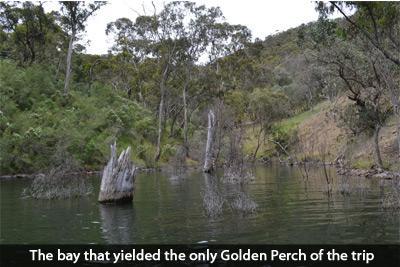
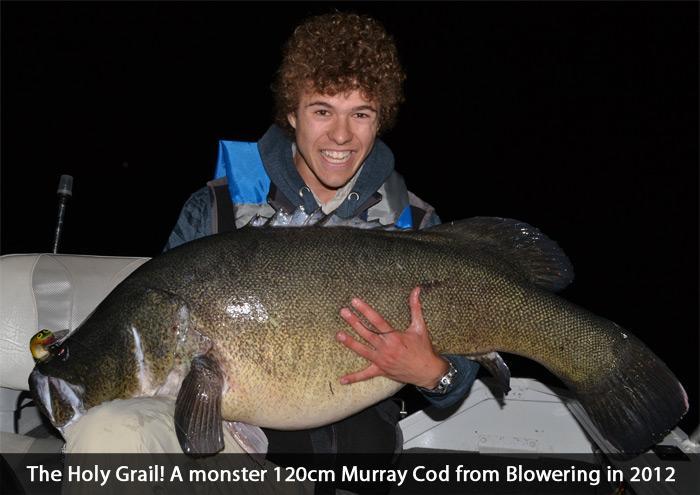
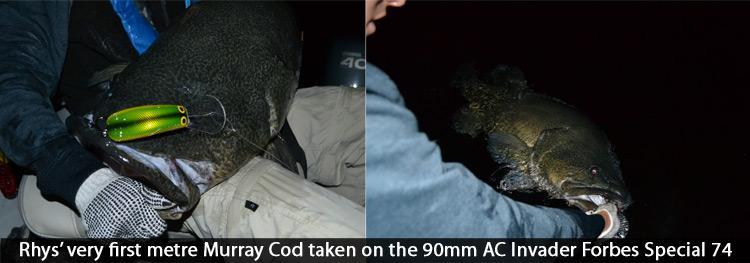
0 comments